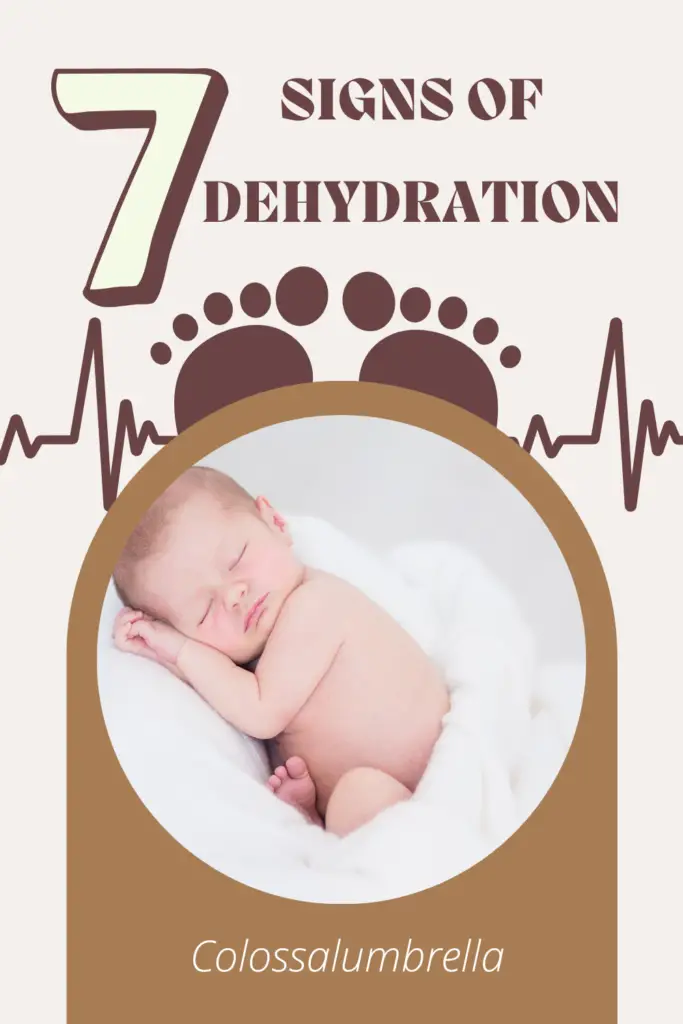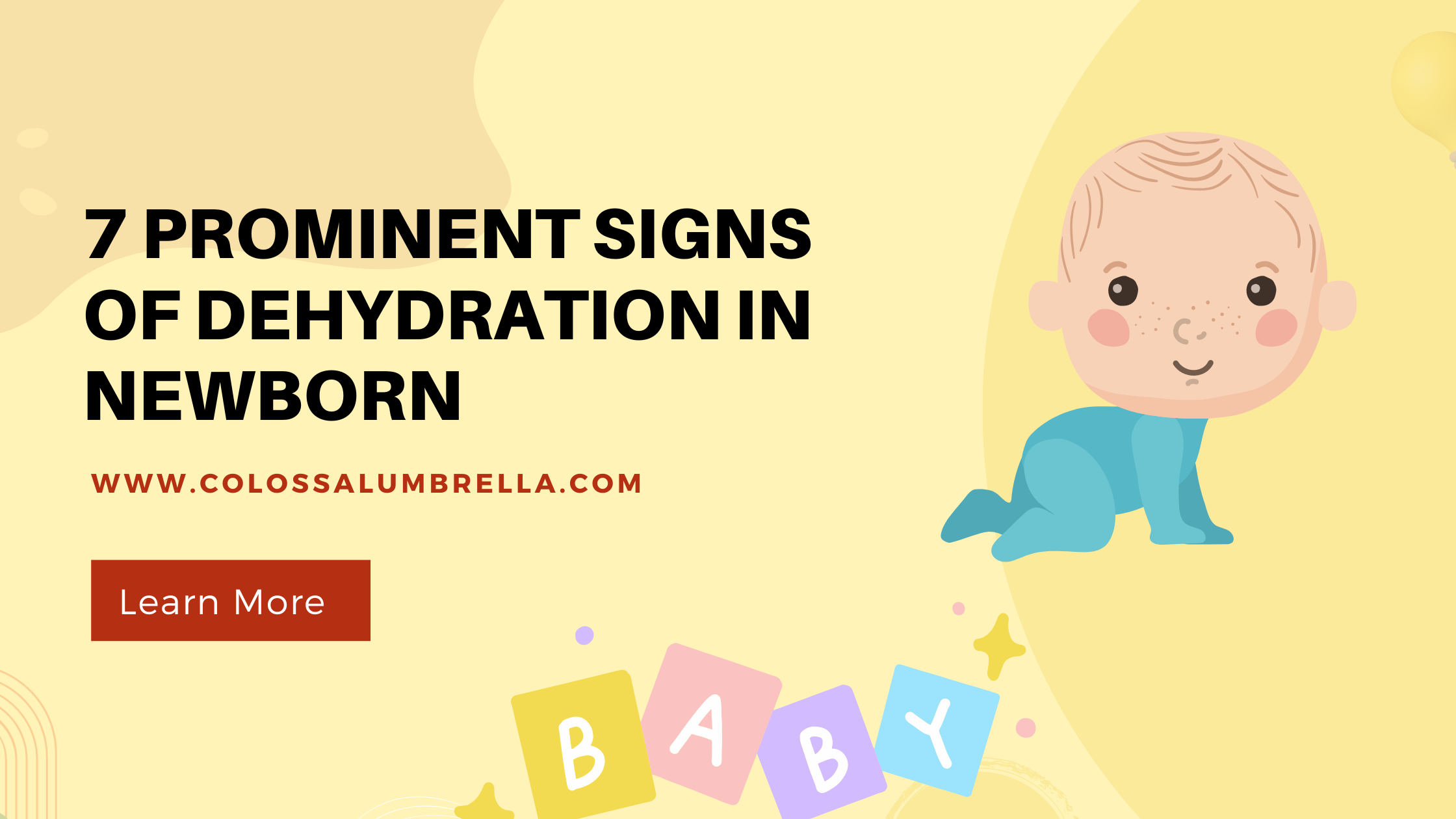Dehydration is the failure of the body to adequately retain water and other fluids, leading to an increased risk of serious health complications. Whether a newborn or toddler, dehydration can happen to anyone. This article covers 7 prominent signs of dehydration in newborn and ways to prevent it.
It is not uncommon for new parents to become so focused on all the potential dangers associated with caring for a newborn that they overlook even common issues like dehydration. However, it’s important to be able to take notice if your child is at risk of dehydration so you can get them the help they need as quickly as possible. This condition is relatively common among babies and can lead to many different health issues. Dehydration in a newborn doesn’t have any obvious symptoms, but if you know what you’re looking for, identifying early signs of dehydration can help prevent further complications before they begin.
7 Signs of dehydration in newborn
Constipation
Newborn babies are at risk of becoming constipated especially those who are breastfeeding. This is because infants have a less-developed digestive system than adults, making it difficult for them to process certain foods. Poor nutrition is the most common cause of newborn constipation, which can lead to dehydration as well as other health issues that are associated with inadequate hydration. You can treat constipation by giving your child diluted prune juice or water mixed with warm cereal, as well as by increasing their intake of fiber.
Subscribe To grab Free coloring Printables and free Planner
Lowered Urination Frequency
Urination frequency is typically a good indicator of hydration levels in infants. This is one of the prominent signs of dehydration in newborn. If your baby’s urination frequency drops, it may be a sign that they are becoming dehydrated. Some babies will naturally urinate less frequently than others, particularly if they’re gaining weight at an appropriate rate. However, a sudden drop in urination frequency, accompanied by other symptoms of dehydration, could be a sign that your child is at risk.
You can help prevent lowered urination frequency by maintaining a healthy diet for your child. A balanced diet is particularly important for infants, who are at an increased risk of dehydration due to their smaller size. A healthy diet for infants should be high in proteins and low in sugars, with plenty of fresh fruits and vegetables for important vitamins and minerals.
Dark Colored Urine
Babies will urinate frequently, so it’s important to monitor the color and consistency of their urine. If it’s a dark color, this may be a sign that your child is becoming dehydrated. However, it’s important to note that the color of urine will depend on the foods you’re eating. A diet full of fruits and vegetables will result in darker urine, while a diet high in sugars will cause urine to be lighter in color. However, drinking too little water will cause urine to be darker in color, which can be a sign that your child is dehydrated.
Drinking plenty of water is important for all infants, but it’s especially important for those who are feeding with formula. AAP recommends that infants who are breastfeeding drink about 1 liter of water per day, while those who are formula-fed should consume 2 liters. If your child’s urine appears dark, try increasing the amount of water they’re consuming to see if this can help.
Dry Mouth and Skin
Many babies are born with dry lips and skin, but if this condition persists, it may be one of the signs of dehydration in newborn. Other signs of dehydration include your child’s mouth being unusually dry (not just the lips) and feeling abnormally thirsty. You can help rehydrate your child by adding more water to their diet and by moisturizing their skin with a natural oil like coconut oil. You can also try giving your infant a small drop of water directly from your mouth.
Loss of Weight
Dehydration can be a sign of inadequate nutrition. If your child is losing weight but is eating as much as they should be, it could be a sign that they’re not getting enough nutrients. Any weight loss should be reported to your child’s doctor as soon as possible, as it could be a sign of dehydration, which could be followed by a drop in temperature. If your child is losing weight and experiencing other signs of dehydration, this could indicate an issue with the food you’re giving them or an issue with how effectively they’re processing their food.
Extreme Infant Fatigue
Babies are typically exhausted. Nursing babies are especially tired, as breastfeeding can be a tiring activity. However, if your child is experiencing extreme fatigue that is unrelated to breastfeeding, this may be a sign that they are experiencing dehydration. If your child is experiencing extreme fatigue, it could be caused by several different things. It’s important to identify whether this condition is caused by a serious problem or by something relatively easy to treat, like dehydration.
Extreme infant fatigue is typically accompanied by other signs of dehydration, like a dry mouth and thirst. However, this condition can also be caused by a more serious underlying problem if your child is experiencing extreme fatigue without these other symptoms.
Slow Breathing Rate
If your child’s breathing rate has slowed to a rate that is noticeably less than normal, this could be a sign that they’re dehydrated. Babies’ normal breathing rates will vary, but a significant drop in the normal rate is something you should report to your child’s doctor. Dehydrated babies are less able to control their breathing rate due to reduced oxygen levels in the blood, which is why it’s important to catch this problem early. If your child’s breathing rate slows significantly and they also show signs of being extremely thirsty and lethargic, this could be a sign that they’re dehydrated and need immediate medical attention.
What are the causes of dehydration in a newborn?
Newborns are at risk of becoming dehydrated due to several factors. Premature babies have a higher risk of dehydration because they’re often born with a lower body weight than full-term infants. Newborns who are born with a low birth weight are also more likely to become dehydrated, as are those who are formula-fed instead of breastfed. Most often, dehydration occurs when babies don’t consume enough water.
Babies who are breastfeeding will get most of the water they need from the milk their mothers are providing, but infants who are formula-fed (or who are being given expressed breast milk) will need to drink water to stay hydrated.
How to treat dehydration in newborns
To prevent your newborn from becoming dehydrated, you should focus on consuming and rehydrating. Your newborn will also need to be monitored regularly, as they are more susceptible to dehydration than adults. You can prevent dehydration in your newborn by making sure they are consuming enough water. This is particularly important if they are formula-fed, as they are less likely to consume enough water if they are being fed with formula.
Babies who are breastfeeding should also be drinking plenty of water. You can also help prevent dehydration in your newborn by following a healthy diet. This includes eating plenty of fresh fruits and vegetables, which are great sources of water. You should also make sure your newborn is getting enough rest. Newborns need lots of sleep, as this is when their brains develop.

Conclusion
Newborns are particularly susceptible to the effects of dehydration due to their young age. Parents need to be aware of the signs of dehydration in newborn and know how to prevent it from happening in the first place. Newborns need to consume plenty of water, especially if they are formula-fed.
Parents should try to feed their newborns water along with their formula to make sure they are getting enough hydration. It’s also important to follow a healthy diet to avoid dehydration, as a well-balanced diet is the best way to ensure your newborn is getting the nutrients they need.

One thought on “7 Prominent Signs of dehydration in newborn & how to prevent it.”
Comments are closed.